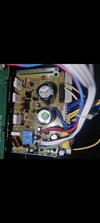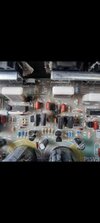I have a Hybrid PB 15" Active Speaker.
It has 2 channels and a Speakon Amp out port.
The speak blew due to an electrical surge. I replaced the fuse, Replaced all 4 transistors (2x A1941 and 2x C5198) I replaced 2 R100 resisters (brown black brown gold) but still no sound.
Speaker Powers up but the Relay does not click. If I connect a audio source into the speaker the speaker does not play but if I connect another speaker to this speaker using the line out port , the connected speaker plays which means the Inputs are fine and the output line out is fine but the Speakon Amp out doesn't play or power an external speaker and the internal sub and tweeter don't play.
Capacitors don't look popped
What else can I check? Is my relay blown or is something else causing the relay not to even start up.
Attached is a image of what the board looked like when the 2 resisters blew (R100 brown black brown gold) and the second image is what the amp board looks like.
It has 2 channels and a Speakon Amp out port.
The speak blew due to an electrical surge. I replaced the fuse, Replaced all 4 transistors (2x A1941 and 2x C5198) I replaced 2 R100 resisters (brown black brown gold) but still no sound.
Speaker Powers up but the Relay does not click. If I connect a audio source into the speaker the speaker does not play but if I connect another speaker to this speaker using the line out port , the connected speaker plays which means the Inputs are fine and the output line out is fine but the Speakon Amp out doesn't play or power an external speaker and the internal sub and tweeter don't play.
Capacitors don't look popped
What else can I check? Is my relay blown or is something else causing the relay not to even start up.
Attached is a image of what the board looked like when the 2 resisters blew (R100 brown black brown gold) and the second image is what the amp board looks like.



